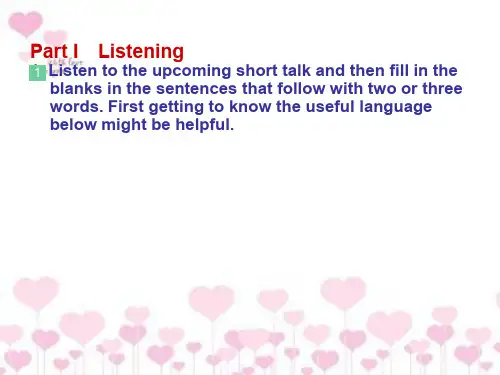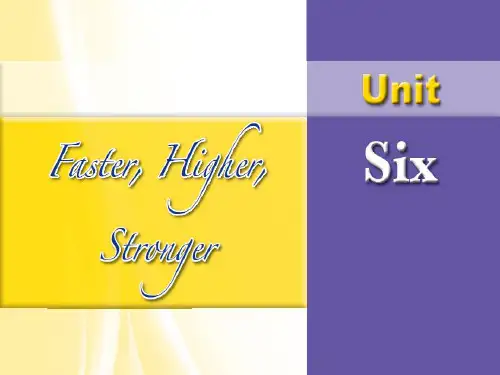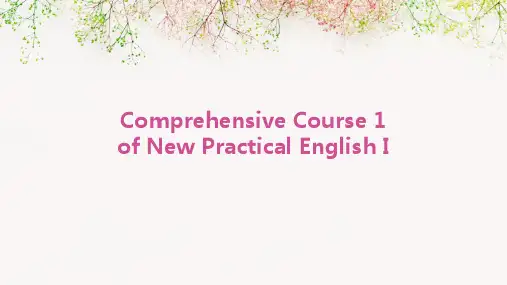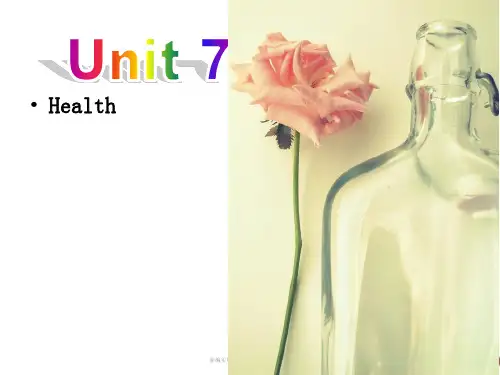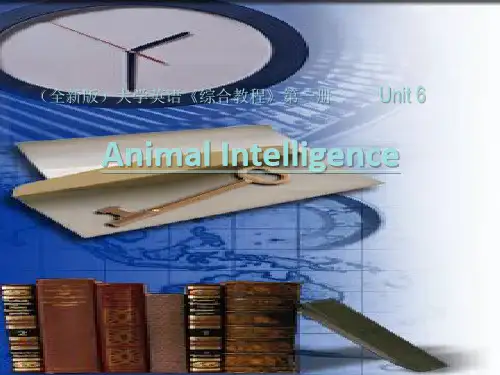新编实用英语综合教程一Unit6OlympicsandSports精品PPT课件
- 格式:pptx
- 大小:4.29 MB
- 文档页数:40
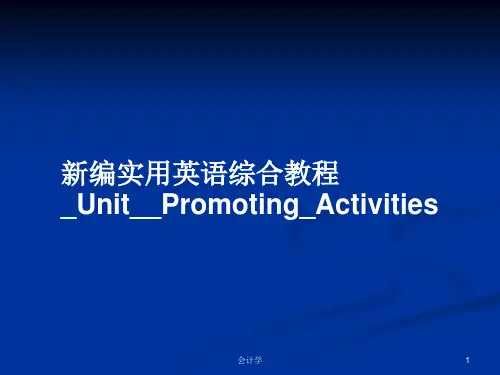
![新编实用英语综合教程一Unit 6 Olympics and Sports[优质ppt]](https://uimg.taocdn.com/14f81511e518964bcf847c73.webp)
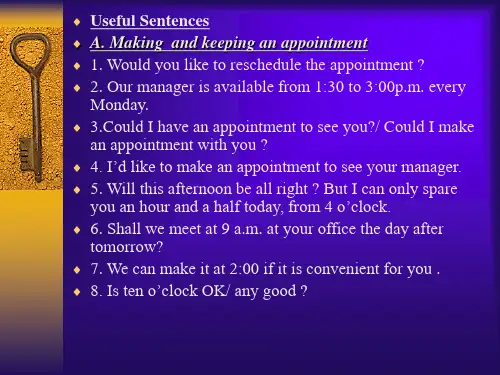
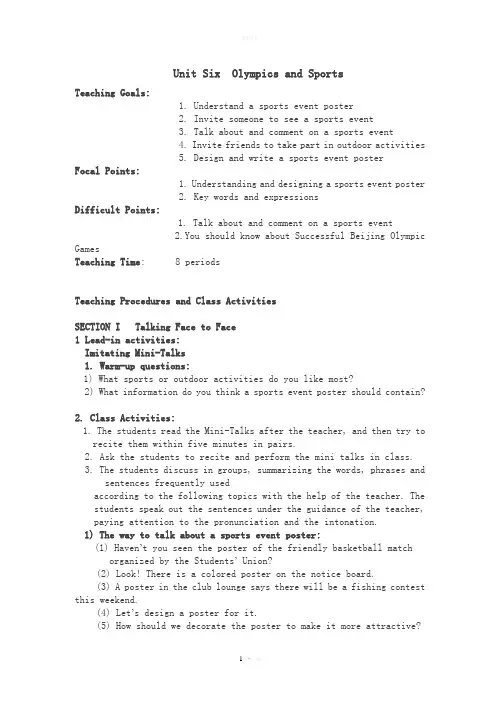
Unit Six Olympics and SportsTeaching Goals:1. Understand a sports event poster2. Invite someone to see a sports event3. Talk about and comment on a sports event4. Invite friends to take part in outdoor activities5. Design and write a sports event posterFocal Points:1. Understanding and designing a sports event poster2. Key words and expressionsDifficult Points:1. Talk about and comment on a sports event2.You should know about Successful Beijing Olympic GamesTeaching Time: 8 periodsTeaching Procedures and Class ActivitiesSECTION I Talking Face to Face1 Lead-in activities:Imitating Mini-Talks1. Warm-up questions:1) What sports or outdoor activities do you like most?2) What information do you think a sports event poster should contain?2. Class Activities:1. The students read the Mini-Talks after the teacher, and then try torecite them within five minutes in pairs.2. Ask the students to recite and perform the mini talks in class.3. The students discuss in groups, summarizing the words, phrases andsentences frequently usedaccording to the following topics with the help of the teacher. The students speak out the sentences under the guidance of the teacher, paying attention to the pronunciation and the intonation.1) The way to talk about a sports event poster:(1) Haven’t you seen the poster of the friendly basketball matchorganized by the Students’ Union?(2) Look! There is a colored poster on the notice board.(3) A poster in the club lounge says there will be a fishing contest this weekend.(4) Let’s design a poster for it.(5) How should we decorate the poster to make it more attractive?(6) Look at the poster. It seems that there will be an exciting eventhappening in the community.(7) Let’s make a poster for the badminton match together.2) The way to invite people to see a sports event:(1) There is a basketball match at the college gymnasium. Would you like to go and watch it?(2) I’m eager to watch the game. Would you like to go with me?(3) It says there will be a chess game at the Students’Center on Sunday. Let’s go to watch it.(4) We are going to hold a marathon race next week.(5) Are you interested in the tug-of-war matches in the college?(6) Would you like to join us in supporting the college football team tonight?3) The way to talk about or give comments on a sports event:(1) The match is really interesting and exciting.(2) Picnicking is a very good outdoor activity.(3) Both the teams played incredibly well.(4) I am crazy about the performance of our team.(5) Our team has an unbelievable victory against the other school team.4) The way to invite people to take part in outdoor activities:(1) Are you interested in fishing?(2) I enjoy fishing a lot. It’s a healthy sport. Why not go fishing with us?(3) Mountain climbing is a very good outdoor activity. Will /Would youlike to join us in climbing the mountain outside the city thisSunday?(4) How about picnic? Picnicking is a very interesting outdoor activity.Most people enjoy having a picnic in summer.Studying Posters1. Warm-up questions:1) What do you think is the use of a poster?2) What can we know from a poster?2. The students read and translate the two sample posters under theguidance of the teacher.2 Act-out activities:Sample dialogues1. The students read the sample dialogues after the teacher, trying toimitate the teacher’s pronunciation and intonation.2. Ask the students to read the sample dialogues in pairs.3. Groups work: Ask the students to categorize the useful sentences inthe sample dialogues into two groups.1) Sentences used for inviting people to watch sports games and givingresponses:(1) There is a basketball match at the city gymnasium. Would you like to go to watch it?(2) Let’s go to cheer/support for our team.(3) I’m eager to watch the game.(4) Are you going to the rowboat match?(5) Are you going to be on the Chinese students’ team?(6) What time is the match and where?2) Sentences used for commenting on sports events:(1) The Normal University team is not easy to beat.(2) The match will be very exciting.(3) Wow! That’s going to be exciting.4. Group work: Each group member is required to invent a sports eventposter, and then tell and show it to the other members.5. Pair work: Make a dialogue about inviting your partner to watch abasketball game. Perform it in class.6. Do Exercises 5 and 6 in pairs.3 After-class activities:1. Pair work: Each pair makes a dialogue according to the tips in oneof the five tasks in Speak and Perform. There will be a class presentation in the next class period.2. Group work: Design a sports event poster using PPT, present it andpractice talking about this poster to other groups in the next class period.3. Pay a visit to the website to watch the video about giving commentson a sports event.SECTION II Being All Ears1 Learning Sentences for Workplace Communication1. Give the students a few minutes to read through the printed materials for each listening item.2. Listen to the tape for the first time by looking at the correspondingChinese version. While listening to the English sentences, the students try to remember the meaning of each of the sentences they have heard. The focus here is on cross-reference of the English sentences and their Chinese meanings.3. Play the tape for a second time, and ask the students to do theexercises in this section.4. Play the tape for the third time with a pause after each sentence,and ask the students to repeat the sentence during the pause.2 Handling a Dialogue1. Give the students a few minutes to read through the printed materials for each listening item.2. Listen to the tape for the first time without looking at the book.3. Play the tape for a second time, and ask the students to answer thefollowing questions orally:1) Why do Bob and his friend want to spend the day in the open air?2) Where will they go?3) How will they go there?4) What will they enjoy there?5) Will they swim in the lake? Why or why not?4. Play the tape for the third time, and the students read the dialoguesfollowing the tape simultaneously and trying to catch up the speed and simulate the speakers’ tones.5. Do the exercises in this section.3 Understanding a Short Speech/Talk1. Give the students a few minutes to read through the printed materials for each listening item.2. Listen to the tape for the first time without looking at the book.3. Play the tape for the second time, and ask the students to do theexercises in this section.4. Play the tape for the third time with a pause after each sentence,and ask the students to take notes of the key words.SECTION III Trying Your HandPracticing Applied Writing1 Sample analysis:The teacher summarizes briefly the format and language used in a sports event poster. The teacher may show the following passage with PPT (If there is no PPT prepared, ask the students to take a dictation of the passage.). Afterwards, ask the students to read it and translate it into Chinese orally.A sports event poster is written and posted to inform people of a particular sports event so that they can come to watch it. Therefore, the name, the time, the place of the match and the competing teams should be clearly stated. Very often the availability of tickets is also mentioned.A sports event poster often takes the following format:21. The students read and translate the two sample posters into Chinese.2. Do Exercises 2, 3 and 4 in groups.Writing Sentences and Reviewing Grammar1 The teacher gives a brief summary of the contextual reference oftenses.1. The verb tense form is consistent with the time adverbial used.2. The verb tense of the subordinate clause is consistent with that in the main clause.3. In time and conditional adverbial clauses, present tense is used to indicate the future tense.4. When presenting universal truth and objective existence, simplepresent tense is used regardless of time reference.5. When writing a paragraph, special attention should be paid toco-reference of tense forms across sentences.2 Do Exercises 5, 6 and 7 in groups.3 Assignments for this section:Group work: Design a poster for a sports event your class is engaged in with PPT. There will be a Poster Show in the next class period.SECTION IV Maintaining a Sharp EyePassage 1 Dancing Beijing1 Warm-up questions:1. Do you know anything about Olympic emblem? And what is that of the2021 Beijing Olympic Games?2. What impressed you most by the 2021 Beijing Olympic Games?2 Guided reading aloud of the passage:The students read the passage after the teacher for the first time, trying to imitate the teacher’s pronunciation and intonation, and then read it in class individually. The teacher should pay attention to correcting the students’ pronunciation and intonation.3 Explanation of difficult words and expressions:The students are required to have a discussion in groups to pick out the difficult words and expressions in the whole passage which they don’tunderstand and report them to the class. The teacher will demonstrate the usage of those chosen points, and then ask the students to make up at least two sentences with them in groups. In this passage, apart from what have been chosen in Language Points in Teacher’s Book, the following points are encouraged to be chosen and practiced on.1. give sth./sb. high praise: to express a fairly favorable judgment of sth.e.g. He has been given high praise as both an actor and director by critics.2. be filled with: to make something full by entering an amount of a substancee.g. Her eyes were filled with tears.Books are filled with many wonders.3. symbol n. something used for representing something else, esp. amaterial object representing something immateriale.g. The symbol on the packet is a guarantee that the food has been produced organically.4. put sth. up to a new level: to make sth. in a position, in a scaleor rank (as of achievement, significance, orvalue)e.g. We are about to put the protection against terrorist wars to a new level.5. stand for: to represent, symbolizee.g. She also learned a kind of alphabet for the blind, in whichdifferent finger positions stand for different letters of the alphabet.6. at ease: relaxed and confident and not nervous or embarrassede.g. Your presence puts my mind at ease.7. function as: to serve as; to act ase.g. This big sofa can also function as a bed.4 Teaching suggestions for understanding the passage in detail:1. Paragraph 1:1) Ask one or two students to read this paragraph.2) Pair work: The students have a discussion to find the answers to thefollowing questions:(1) What story does every emblem of the Olympics usually tell?(It usually tells a beautiful story of the host country of the Games.)(2) What are the comments all the IOC officials gave to the design ofthe emblem of Dancing Beijing?(They all said it was the best one ever designed.)2. Paragraph 2:1) The students read this paragraph for three times by themselves, tryingto remember the meanings of the passage.2) Meanwhile the teacher writes down the following sentences on theblackboard or shows them with PPT. The students are asked to fill in the missing words in the following passage without looking at the book.The Beijing 2021 Olympic Games emblem is filled with Beijing’s ________, and carries the commitment made to the ________by a country that has a population of 1.3 billion and by a nation with both ______________and ______________.(hospitality and hopes, Olympic Movement , ancient civilization, modern culture)3. Paragraphs 3 and 4:1) The students read these paragraphs together.2) Group work: Give each group 5 minutes to prepare the translation ofthese two paragraphs, and then an oral class presentation is required.4. Paragraphs5. 6 and 7:1) Ask the students to read these three paragraphs by themselves.2) Meanwhile, the teacher writes down the following table on theblackboard or shows it with PPT. The students are required to complete the outline of these three paragraphs in groups.Key: 1) Dancing Beijing 2) hospitality and hopes3) the Olympic Movements 4) luck and happiness5) mind and vitality5 Summary of the passage:Group work: The students have a discussion to find the topic sentence for each paragraph.(Reference answers:Para. 1: Every emblem of the Olympics tells a beautiful story.Para. 2: The Beijing 2021 Olympic Games emblem is filled with Beijing’s hospitality and hopes.Para. 3: “Dancing Beijing〞 is a symbol of trust and an expression of China’s confidence.Para. 4: The red color of Beijing 2021 Olympic emblem represents Chinese people’s longing for luck and happiness and theirexplanation of life.Para. 5: Olympic Games function as the stage where heroes are made, records broken and medals earned.Para. 6: The Beijing 2021 Olympic emblem shows that China is opening its arms to welcome the rest of the world to join the Olympics.Para. 7: People from all over the world are welcome to China to share the experience of “One World, One Dream〞.)6 Suggested methods for doing exercises:1. Group work for Exercises 2 and 3: Underline the useful expressionsin each sentence.2. Pair work for Exercises 4 and 5: Each student writes out the sentencepatterns they are going to use and then write out their translation.Afterwards they check up each other’s work, correcting the mistakes.At last, the whole class repeat the English translation of the sentences together.7 Assignments for this section:1. Recite Paragraph 4 of the passage.2. Preview Passage II.PASSAGE II Closing Speech by Jacques Rogge1 Warm-up activity:Group work: Suppose you were the president of the International Olympic Committee, and you were invited to make the closing speech for Beijing 2021 Olympic Games. Deliver your speech within the group first, and then the group representatives give their performance in class.2 Guided reading aloud of the passage:The students read the passage after the teacher for the first time, trying to imitate the teacher’spronunciation and intonation, and then read it in class individually. The teacher should pay attention to correcting the students’ pronunciation.3 Explanation of difficult words and expressions:The students are required to have a discussion in groups to pick out thedifficult words and expressions in the passage which they don’t understand and then report them to the class. The teacher will demonstrate the usage of those chosen points, and ask the students to make up at least two sentences with them in groups. In this passage, apart from what may have been chosen in Language Points in Teacher’s Book, the following points are encouraged to be chosen and practiced on.1. awe sb. with sth.:arouse one’s overwhelming feeling of admiration, fear, or wonder with sth.e.g. You awed us with the way you handled such a touchy situation.2. achievement n.something accomplished, as through great effort, skill, or couragee.g. Let me congratulate you on your great achievements.3. wish the best for: express one’s hope toward somebody that he or shewill be in the best state or position.e.g. We wish the best for your Christmas and the new year.4.inspire v.to fill with an animating, quickening, or exalting influencee.g. Her courage inspired her followers.5. keep alive: stay in a living or energetic state, condition, or positione.g. The big factories are trying to keep alive by cutting costs.6. in accordance with:according to a rule or the way that says something should be donee.g. The mayor must make policies in accordance with the bill passed in the Congress.4 Teaching suggestions for understanding the passage in detail:1. Paragraphs 1, 2 and 3:1) Ask the students to read these paragraphs individually.2) Group work: Give each group 3 minutes to prepare the translation ofthese three paragraphs, and then an oral class presentation is required.2. Paragraph 4:1) The students read this paragraph together.2) Dictation practice. The teacher reads the paragraph one sentenceafter another for two times. Afterwards, the students check up their work with their partners.3. The rest paragraphs of the passage:1) The students read these four paragraphs by themselves for two times.2) Meanwhile, the teacher writes down the following passage on theblackboard or shows it with PPT. The students are required to fill in the blanks with the missing words without looking at the book.The athletes tonight were true (1)_______. They showed the unifying (2)_______. They will keep the Olympic spirit alive when (3)_______. These were truly exceptional (4)_____! Now I (5)________the 2021 Beijing Olympic Games closed.(Key: 1. role models 2. power of sport 3. they return home 4. Games 5. declare)6Summary of the passage:1. With the help of the teacher, the students are required to findadjectives phrases in the passage describing the Olympic Games. One is given as an example: wonderful volunteers(Hints: glorious day, dazzling venues, talented athletes, true role models, unifying power of sport, warm embrace of competitive rivals, exceptional Games)2. Groups work: Each group tries to pick out at least 5 expressions orsentences from the passage witch they think are worth remembering.Afterwards, ask some groups to write them down on the blackboard and ask the whole class to read them aloud.7 Suggested methods for doing Exercise 7:Group work: Ask the students to prepare the Chinese translation of the sentences in Exercise 7 in groups, and there will be a group presentation in class afterwards.8 Assignments for this section:1. Recite Paragraphs 3 and 4 of the passage.2. Preview Sections I, II and III in Unit Seven.。
